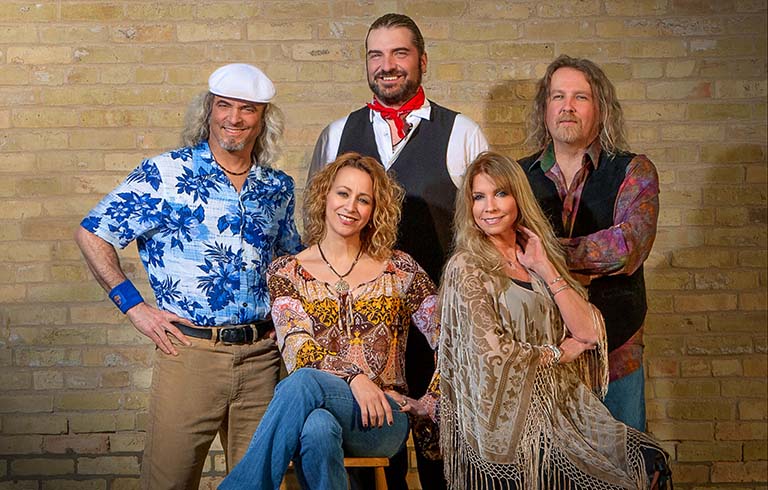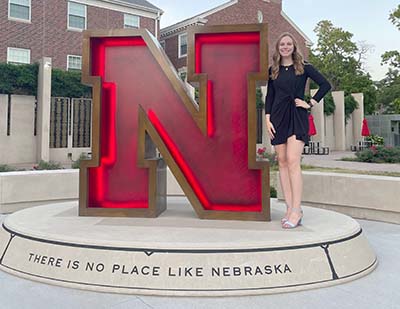
Tusk: Fleetwood Mac tribute coming to Trine Nov. 17
Tusk, the Ultimate Fleetwood Mac Tribute, will bring the band’s greatest hits to the stage of Trine University’s T. Furth Center for Performing Arts on Friday, Nov. 17.
October 10, 2022

 Trine University biomedical engineering major Paige Schiebel enjoyed her first Research
Experiences for Undergraduates (REU) opportunity so much, she decided to apply again.
Trine University biomedical engineering major Paige Schiebel enjoyed her first Research
Experiences for Undergraduates (REU) opportunity so much, she decided to apply again.
Paige first heard about the National Science Foundation Research Experiences for Undergraduates program after reading an article about biomedical engineering student Alex Pessel, who graduated in 2021, and his REU experience at the University of Maryland.
“I wanted to learn more about graduate school and gain research experience,” she said.
She was an NSF-REU scholar at the University of South Carolina during the summer of 2021, and this past summer participated in the program at the University of Nebraska-Lincoln.
“I wanted to further solidify my decision to attend graduate school and explore research labs and the biomedical engineering program at an additional university,” she said. “I also wanted to build my technical toolbox for graduate school.”
Community of scholars
Her REU at South Carolina had focused on nanoparticle-based therapeutic development for Alzheimer’s disease, and the University of Nebraska-Lincoln REU program attracted her because of a specific project there, “Engineering Nanomedicine for the Neurosciences,” led by Forrest Kievit, Ph.D., in the Department of Biological Systems Engineering.
“I am very interested in biomedical engineering specifically related to neuroscience,” she said. “I wanted to find an REU where I could build and expand upon my knowledge of the brain and neurodegenerative diseases.”
“Beyond the project, I was drawn to the program’s initiative to create a community of scholars across multiple disciplines,” she said, noting that the university hosts 15 different REU programs. “Not only did I have the opportunity to work with BMEs from across the country, I was also able live and interact with students from other REU programs the university hosted.”
Breaking through barriers
Kievit’s lab is working to develop nanoparticle-based delivery vehicles to transport therapeutics into the brain to effectively treat brain cancer and traumatic brain injuries. Paige’s work focused on utilizing a blood-brain barrier (BBB) model in the laboratory to understand how BBB tight junction proteins are affected by oxidative stress.
“Tight junctions use proteins to form a zipper-like seal between the brain’s endothelial cells , preventing toxins and pathogens from entering the brain,” she explained. “The three main proteins I analyzed were claudin-1, claudin-5, and ZO-1.”
In oxidative stress, highly reactive chemicals formed from oxygen contribute to the development of cancer and traumatic brain injury.
Paige used blood vessel lining cells from mouse brains to develop a model of the human BBB.
“My daily responsibilities included reviewing literature, analyzing data and running lots and lots of experiments,” she said. “I used two methods to monitor the integrity of the tight junctions in my mouse brain endothelial cells and this process typically took three to four hours each day and lasted a period of five days. On day five, I would terminate my cells and restart the process again the next week.”
She found that, as the concentration of types of reactive oxygen increased, the blood-brain barrier became more permeable. This correlated with an increase in the expression of claudin-1.
“These findings ultimately set the groundwork for gaining an understanding of how we can bypass the BBB via the activation or inactivation of a protein and deliver therapeutics into the brain,” Paige said.
Raising awareness
Paige said that overall, the experience was “amazing.”
“I thoroughly enjoyed meeting driven students from around the country whom I am now glad to call friends,” she said. “I was blown away by the hospitality of the program and gained confidence in my abilities as a researcher.”
She plans to attend graduate school, work in industry and eventually make her way back to academia. In the meantime, she is working to raise awareness of the NSF-REU program on Trine’s campus.
She has shared her experiences at P2 events and BMES REU student panels. As part of her Honors Project, she is working with University Marketing and Communications to develop a video to inform current and prospective students about REU opportunities.
“My REU experiences have really helped me explore my research interests and solidify my desire to pursue neuroscience research in the future,” she said. “The experience helped me develop many great writing, researching and communicating tools that I have taken back to the university and plan to apply as my career develops.”
Last Updated: 10/10/2022